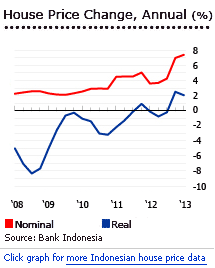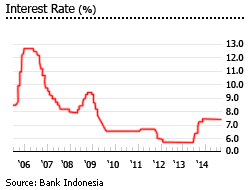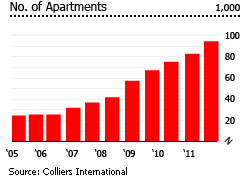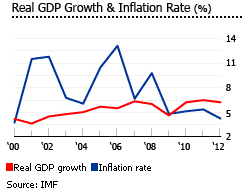Indonesia's property price rises slowing
 Indonesia’s property market is now slowing, despite robust economic growth, helped by market-cooling measures imposed by the authorities. True, Indonesia’s residential property price index (14 major cities) rose by 7.88% during the year to end-Q2 2014, but this is a significant slowdown on 12.11% year-on-year price increases during the same period last year (all figures from Bank Indonesia). Look at it this way: when adjusted for inflation property prices rose during the past year by just 1.19%.
Indonesia’s property market is now slowing, despite robust economic growth, helped by market-cooling measures imposed by the authorities. True, Indonesia’s residential property price index (14 major cities) rose by 7.88% during the year to end-Q2 2014, but this is a significant slowdown on 12.11% year-on-year price increases during the same period last year (all figures from Bank Indonesia). Look at it this way: when adjusted for inflation property prices rose during the past year by just 1.19%.
Nominal property price figures can be particularly misleading in Indonesia, because inflation has been high, and remains high. Residential property has been attractive to rich Indonesians and others partly as a protection against inflation.
All Indonesia’s major cities saw nominal property price rises. Makassar led the market with house price increases of 19.28% (11.89% inflation-adjusted) during the year to Q2 2014. It was followed by Manado (13.36% nominal), Surabaya (12.78%), Denpasar (10.16%), Bandar Lampung (9.37%), Banjarmasin (7.81%), Palembang (7.34%), Bandung (7.25%), and Jabodebek-Banten (6.87%).
Jakarta had a y-o-y price-increase after-inflation of only 0.25%. Jakarta is classified by Bank Indonesia under Jabodebek-Banten, which includes Jakarta´s component cities (acronym: Jakarta, Bogor, Depok and Bekasi).
RESIDENTIAL PROPERTY PRICES IN INDONESIA’S MAJOR CITIES, Q2 2014 |
|||||
| Major cities | Y-O-Y (%) | Q-O-Q (%) | |||
| Nominal | Real | Nominal | Real | ||
| Bandung | 7.25 | 0.60 | 2.55 | 2.22 | |
| Bandar Lampung | 9.37 | 2.59 | 6.97 | 6.62 | |
| Banjarmasin | 7.81 | 1.12 | 1.84 | 1.51 | |
| Denpasar | 10.16 | 3.33 | 1.49 | 1.16 | |
| Palembang | 7.34 | 0.68 | 2.21 | 1.88 | |
| Semarang | 2.50 | -3.86 | 0.39 | 0.06 | |
| Yogyakarta | 4.07 | -2.38 | 1.66 | 1.32 | |
| Padang | 4.33 | -2.14 | 1.27 | 0.94 | |
| Medan | 3.99 | -2.45 | 0.94 | 0.61 | |
| Makassar | 19.28 | 11.89 | 6.97 | 6.62 | |
| Manado | 13.36 | 6.34 | 6.56 | 6.21 | |
| Surabaya | 12.78 | 5.78 | 2.46 | 2.13 | |
| Pontianak | 1.69 | -4.62 | 0.18 | -0.15 | |
| Jabodebek-Banten | 6.87 | 0.25 | 1.39 | 1.06 | |
| Composite 14 Cities | 7.88 | 1.19 | 2.15 | 1.81 | |
| Source: Global Property Guide | |||||
Many cities registered nominal price rises so small that in fact they were actually declines in value, in real terms, including Padang (4.33%), Yogyakarta (4.07%), Medan (3.99%), Semarang (2.5%), and Pontianak (1.69%). All these apparent house price rises actually amounted to declines.
The luxury market has been weakening, with a decline in expatriate arrivals and business travel
because of the economic slowdown. The vacancy rate for Jakarta high-end rental apartments increased from 11.7% to 14.7% y-o-y to end-June 2014, according to Jones Lang LaSalle (JLL).
Vacancy increases pushed some landlords to discount rents, although a number of landlords of good quality apartments managed to maintain stable rents. Overall net effective rents in the luxury apartment market in Q2 2014 stood at US$ 217 per sq. m. per annum, down by 1.5% q-o-q, according to JLL. Apartment capital values softened by 0.8% q-o-q. Average high-end yields were 8.6%, again according to JLL.
There was also a decrease in sales of large houses, which in turn slowed demand more generally, caused by the stricter loan-to-value (LTV) ratio launched in September 2013.
This doesn´t exactly represent any kind of downturn, given that in the first quarter residential property sales rose by "only" 15.33% - but the point is, it really was in fact a slowdown from Q1 2014´s massive quarterly sales increase of 31.54%.
What motivates people in Indonesia to buy property? "Rich [local] investors care mostly for capital appreciation although they also buy apartments to get rental income," says Hasan Pamudji, head of research at Knight Frank, Indonesia. "Yield for high-end apartments can command between 8% and 11%."
But there are more mundane motives, adds Pamudji. "Typical investors in high-end residential in Jakarta comprise of rich Indonesians with some foreigners married to Indonesians. Because of traffic jams, those rich Indonesians have second homes or apartments near their workplaces and they go back to primary houses or apartments in the suburbs.
"There are a growing number of rich Indonesians who are young couples with overseas education who live in high-end apartments, as they are accustomed to living in vertical housing.
"Expatriates tend to rent houses in Kemang, Pondok Indah, Menteng, Kuningan etc where the area has more greenery, international schools, hospitals and entertainment. They also like to rent in high-end apartments or serviced apartments in the CBD and in the south such as Kemang, Pondok Indah, Pejaten."
Property prices are likely to rise about 10% [nominal] in 2014, according to Eddy Hussy of Indonesian Real Estate - a slowdown from the average growth rate of 15% to 17% in the past couple of years. The property market slowdown, says Hussy, is mainly attributable to the lowering of the maximum loan-to-value (LTV) ratio for mortgages used to purchase additional homes, as well as the introduction of a rule that prohibits banks from providing loans for unfinished residential projects, blocking off-plan sales for those without the cash to pay upfront. The LTV ratio cap was set at 60% for second homes, and 50% for any additional properties.
These restrictions mainly affect the mid-market: "We expect transacted prices to be under pressure as volumes have been down, and more incentives are offered such as longer terms of down payment installment and developers’ installment payment," says Knight-Frank´s Pamudji.
"Please note that middle to lower segment typically take out mortgage loans and developers’ installment payment schemes. Buyers for high-end typically use hard cash or developers’ installment payment (progressive until completion)."
The high interest rate enviroment has also hit demand. Total home mortgages increased by only 0.32% q-o-q to IDR282.36 trillion (US$20 billion) in Q1 2014. Stricter mortgage regulations will also slow the market this year.
The average price of strata-title apartments in Jakarta increased by 2.45% to IDR24.4 million (US$2,087) per square metre (sq. m.) in the first quarter of 2014, according to Colliers International, with average prices varying from US$3,274 per sq. m. in Jakarta CBD, US$2,282 in South Jakarta, and US$1,609 in the capital’s non-prime areas. There were about 1,246 units completed in Jakarta in Q1 2014, according to Colliers International, including Kemang Village (175 units), Pakubuwono Terrace (750 units), Sherwood Apartment (100 units) and Woodland Park (221 units). About 20,889 units are expected to be completed this year.
Poor recent housing market performance. Indonesia has experienced a decade of strong economic growth. From 2000 to 2013, the country’s annual real GDP growth rate averaged 5.4%, according to the International Monetary Fund (IMF). This is expected to continue, with real GDP growth of about 5.4% in 2014, and 5.8% in 2015.
Yet from 2008 to 2011, the Indonesian property market saw very weak real growth (if any) relative to its neighbouring Asian countries.
- Property prices rose by 2.56% (-7.68% inflation-adjusted) in 2008
- Property prices increased by 2.3% (-0.28% inflation-adjusted) in 2009
- Property prices rose 2.91% (-3.21% inflation-adjusted) in 2010
- Property prices rose by 5.05% (0.89% inflation-adjusted) in 2011
There is tremendous pent-up housing demand. Indonesia has the world’s fourth largest population of 245 million people. Despite strong economic growth and high levels of investment, some factors that have hampered the growth of Indonesia’s housing market are:
- High mortgage interest rates
- Foreign ownership restrictions
- High costs of building materials
- High tax rates
- Red tape in government
Foreign ownership is difficult in Indonesia. Land titles (hak milik) can only be held by Indonesian citizens. Foreign land ownership is against the constitution.
For apartments, the 1996 regulation (No. 41/1996) states that foreigners who reside in Indonesia, or visit the country regularly for business purposes, can purchase a home, apartment or condominium as long as it isn´t a part of a government-subsidized housing development.
However, foreigners can only hold land-use (hak pakai) deeds, and most developments hold right-to-build deeds (hak guna bagunan). It is not possible for someone to have a land-use deed for a sub-unit of a right-to-build deed. The length of these titles varies as well. Therein lie some of the difficulties and unclear ownership issues.
So foreigners can effectively only lease, and not truly own an apartment for up to 70 years, but not free standing houses. Within this 70-year period, foreigners must also periodically renew their right to use. The initial hak pakai period is for 25 years, then renewed for an additional 25 years and finally 20 years.
"Some foreigners use this," says Knight-Frank´s Pamadji. "However, it is not appealing to them. They [alternatively] sometimes use the nominee scheme or they have an Indonesian spouse. Also, sometimes they use the PMA or setting up under foreign investment company if they have businesses in Indonesia."
Additionally, the threshold or minimum property sales price that a foreigner can purchase is 1.5 billion Indonesian Rupiah, which is around USD168,388. This minimum "purchase" price is quite high in the Indonesian context.
Foreigners may purchase a house on freehold land by written consent from the landowner, for 25 years and extendable to a further 25 years. A mooted change in the law on foreign property ownership would extend the leasehold period to a full 70 years as opposed to 25 years followed by subsequent renewals, was expected at the end of 2010, but is yet to be passed in the House of Representatives, and has encountered opposition, particularly in Bali.
While the passing of this law will be a welcome change, investors will still find it coming up short when compared with the regulations in other countries in the region such as Malaysia and Singapore.
The relatively poor price performance of residential property in Indonesia has been something of a puzzle. There is tremendous pent-up housing demand. Indonesia has the world’s fourth largest population of 245 million people. Despite strong economic growth and high levels of investment, some factors that have hampered the growth of Indonesia’s housing market are:
- High mortgage interest rates
- Foreign ownership restrictions
- High costs of building materials
- High tax rates
- Red tape in government
New President, new hope.
Joko Widodo ("Jokowi"), the Democratic Party nominee, became president of Indonesia on 20 October 2014. A man of the people, a campaigner for clean government, and a highly successful and popular former mayor of Jakarta, Jokowi is a symbol of the demand for reform which is increasingly sweeping Indonesia.
Quite aside from his popular appeal, his "blusukan" regular visits to poor areas across Jakarta wearing simple informal clothes and chatting to people about problems like the price of food, housing, local and flooding and transport problems, Jokowi was an effective reformer during his time as mayor, creating a bureaucratic recruitment system called "lelang jabatan", giving every civil servant the same opportunity to achieve a certain position by fulfilling the required qualifications and passing the test, whose results were announced transparently.
In addition Jokowi introduced a "Healthy Jakarta card" of health insurance, inaugurated the construction of the Jakarta MRT, and re-started the construction of the green line of the Jakarta Monorail. He also initiated programs aimed towards transparency, such as online taxes, e-budgeting, e-purchasing, and a cash management system.
Jokowi was supported by former president Megawati Sukarnoputri, and almost half his cabinet appointees were her people, which has disappointed many observers. But he has been keeping his reform promises. In mid-November he raised the government-subsidized petrol price by more than 30%. Previously fuel subsidies had consumed $21 billion, or 13% of Indonesia´s national budget. Wealthy car drivers, who make up a tiny fraction of Indonesia’s 250m population, benefited the most from cheap petrol, as well as smugglers.
Jokowi promised to cushion the effect of the price rise for poorer Indonesians by distributing benefits through its new education, health and welfare cards.
In November, Fitch re-affirmed Indonesia´s sovereign credit rating at BBB- with a stable outlook citing "strong commitment of the new Government in continuing structural reforms and improving the investment climate´ as one of the key factor." But given a largely hostile legislature stuffed with vested interests, Jokowi faces tough challenges in moving ahead with his reform agenda.
Interest rates heading up again

Bank Indonesia decided to increase the benchmark interest rate by 25 bps to 7.75% on 18th November 2014, in response to the new government´s fuel subsidy reform policy. Interest rates moved down after December 2005, when Bank Indonesia’s policy interest rate stood at 12.75%, falling to 6.00% in June 2013. They have since moved up again in five small steps to the present rate.
The Rupiah is still vulnerable to weakness in moments of global crisis, but it is noticeable that the 2011 ‘crisis of the West’ has hardly affected Indonesia’s exchange rate. In fact slow growth and low interest rates in developed countries since 2008 pushed funds to emerging markets, including Indonesia.
Construction boom

Before the Asian Crisis, according to Bank Indonesia, the supply of apartments in Jakarta rose from around 6,000 units in 1996 to around 18,000 in 1997, with an additional 2,000 units completed in 1998 and 1999. Scant new supply came onto the market from 2000 to 2003, mostly projects started pre-crisis.
Real estate sales picked up in Q4 2001, encouraging developers to launch new projects, albeit slowly. With strong take-up and increasing occupancy rates, construction picked up pace in Jakarta.
Research carried out by Colliers International reveals that:
- In 2004 around 9,500 new units were completed, bringing total supply of new apartments to around 31,500 units.
- In 2005 and 2006, more than 5,000 units were completed annually.
- In 2007 construction exploded, and more than 15,500 units were completed, pushing total supply to 57,353 units.
- During 2008, 19,607 units were added.
- As of Q3 2009, total apartment stock in Jakarta reached 74,920.
- In Q3 of 2011 3363 units were completed, which brought the overall apartment units in Jakarta to 102,265, a 16.6% Y-o-Y increase.
In the last two years the areas of South and West Jakarta have seen an increased supply of apartments because of good infrastructure and facilities like schools, malls, and supermarkets. According to Colliers international’s latest report on Indonesian property market, there was an addition of 3363 apartment units in Q3 of 2011 (an increase of 3.6% q-o-q). Out of this 2250 were large apartments, mostly in West Jakarta.
Pondok Indah is a South Jakarta upscale residential suburb much sought-after by expatriates due
Bali’s stunning growth
In Bali, real estate investment has been rapidly developing in the main tourist areas of Kuta, Legian, Seminyak and Oberoi. Most recently, high-end 5 star projects have been under development on the Bukit peninsula, on the south side of the island. Expatriates have also shown keen interest in buying property in Bali. Bali is one of Indonesia’s wealthiest regions. About 80% of Bali´s economy depends on tourism, of which one offshoot is the growing real estate industry. Both Indonesians and foreigners are showing interest in investing here.
Million dollar villas are being developed along the cliff sides of south Bali, commanding panoramic ocean views. Foreign and domestic (many Jakarta individuals and companies are fairly active) investment into other areas of the island also continues to grow. Land prices, despite the worldwide economic crisis, have remained stable.
There are an estimated 30,000 expatriates living in Bali. The positive economic outlook will likely continue to trigger demand in Bali’s residential sector, causing prices to climb.
Weak mortgage market
Surprisingly, all the building has taken place despite a relatively underdeveloped mortgage market. Indonesia’s mortgage market has grown by an average of 33.5% annually from 2003 to 2008 in nominal terms. But some apparent growth is due to inflation, and mortgage lending has come from a very low base. Despite significant growth during the past five years, mortgage credits were just 2.5% of GDP in 2008, still below the 2.8% of GDP in 1997.
In 2009, in an effort to provide decent housing to low income families and to boost a secondary mortgage market, the government and the central bank signed a joint decree to boost house financing through the sales of mortgage-backed securities. This would allow banks to get quick funds from selling their mortgage claims. The government also decided to increase its subsidy to low cost housing.
Despite the recent financial turmoil, Indonesian banks are strong and adequately capitalized. However, memories of the Asian crisis are still vivid. Banks tend to be extremely cautious in extending housing loans to the real estate industry. According to a Q2 2011 Residential Property Survey by the Bank Indonesia:
- 55.4% of residential property development projects were financed internally
- 29% were financed through bank loans
- 12% of projects were financed by consumer payments (pre-selling)
For home buyers, interest rates at 12-13% (used by 67% of property buyers under house ownership credit or KPR in Q3 2009), relatively low by Indonesian standards, impose a huge burden. During the post-Asian Crisis period, interest rates by commercial banks typically exceeded 20%. The survey also showed that 16.7% of buyers used progressive cash payments, while 7.6% bought using hard cash.
Rental yields good, but property investment unattractive for foreigners
Jakarta recorded rental yields on high-end properties of 7.02% in April 2014, according to Global Property Guide research, significantly down on the 11% three years earlier. Despite this, property investment is relatively unattractive for foreigners, because of the high tax rates that non-residents are liable to pay.
- The tax levied on the average annual income on a rental apartment/property in Indonesia is 20% which is the third highest in Asia, only after Bangladesh (25%) and Malaysia (22.4%).
- A 10% Value-added tax (VAT) is levied on gross rental income.
- Capital gains realized by individuals from the sale of real property in Indonesia are taxed at a flat rate of 5%. The tax base is the transfer value of the property, without any deductions.
- Property tax is levied at 0.5% on the assessed value of the property. The assessment value of taxable property is determined as a percentage of the deemed fair market value of the property
The total cost of buying and then re-selling a residential property (including Registration costs, Real estate agent fees, Legal fees, Sales and transfer taxes), is one of the highest in the region (see Indonesian round-trip property purchase costs, compared to the region).
Foreign ownership restrictions
Pressure for the government to relax foreign ownership rules is growing. The International Real Estate Federation or FIABCI, was the most recent one to air such calls.
In the past, the government has considered extending the property usage rights of foreigners to 70 years, from the current 25 years, with two extensions possible, of 20 and 25 years. More recently, attention shifted to direct foreign ownership of real estate.
Early in 2009, President Yudhoyono stated that he would ask the National Land Agency (BPN), the home minister and the state minister for people´s housing affairs to conduct an in-depth study into granting expatriates home ownership rights.
Theoretically, foreigners can own condominiums or strata-title residential property. However, more than a decade after Regulation 41 of 1996, no foreigner has actually received a strata title certificate of ownership. Foreigners are likewise not allowed to own land.
Foreigners can only control landed property in Indonesia either by setting-up a Penanaman Model Asing (PMA) Company or through long-term leases, with the right to buy if the ownership laws are changed.
However, these schemes add unnecessary costs, management difficulties and risks to foreign property buyers. In some cases, foreigners use loopholes in the existing laws to buy houses, apartments or condominiums indirectly.
For instance, a foreigner will ask a national to buy a house using his money. Then before a notary, the two sign an agreement saying that the national is acquiring a loan from the expatriate worth the same amount of the property value. Part of the agreement is that the loan will be made permanent, while the property used as collateral, can be retaken anytime.
Removing ownership limits could greatly help the real estate sector. Government officials, however, note that safeguards must be placed to prevent speculative purchases. One way of doing this is to limit ownership to permanent residences.
Indonesia’s strong GDP growth

Indonesia’s economy is very much driven by domestic developments, and tends to be insulated from global economic trends. In the first quarter of 2013, real GDP expanded by 6.02% from the same period last year. This is strong growth, but actually the slowest growth rate since Q3 2010 and lower than economists’ expectations, according to Statistics Indonesia. In April 2013, Bank Indonesia, the country’s central bank, lowered its economic growth projections in 2013 to between 6.2% and 6.6% from an initial forecast of between 6.3% and 6.8%.
The slight slowdown was due to slowing exports, government spending and private consumption.
Yet analysts are confident that Indonesia’s economy remains on track. It is hard to see what would dent Indonesia’s growth – it was almost wholly unaffected by the global economic crisis, and the economy grew by 6.2% in 2012, after real GDP growth rates of 6.5% in 2011, 6.2% in 2010 and 4.6% in 2009, despite the global economic slowdown.
In February 2013, the overall unemployment rate dropped to 5.92% from 6.92% from the same period last year, according to Statistics Indonesia.
The annual inflation rate is projected to surge to as high as 7.76% if the government hikes subsidized fuel prices this year. While this seems high, inflation is actually now less high than in the recent past, suggesting that Indonesia’s growing economy is becoming more flexible and productive as it grows. In April 2013, inflation slowed to 5.57%, and though this still above the central bank’s target of between 3.5% and 5.5%, Bank Indonesia has felt able to keep its benchmark rate at a record low of 5.75% since February 2012. From 2009 to 2012, the average annual inflation rate in the country has been at 4.9%.